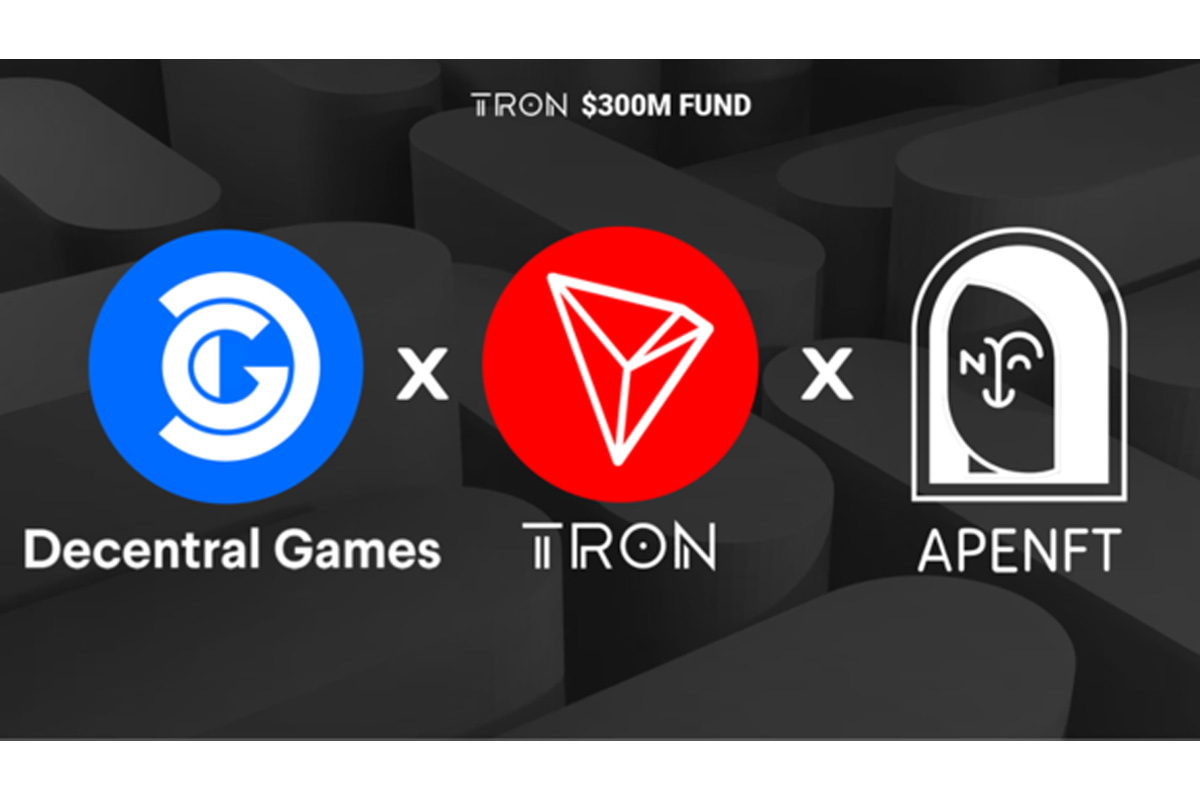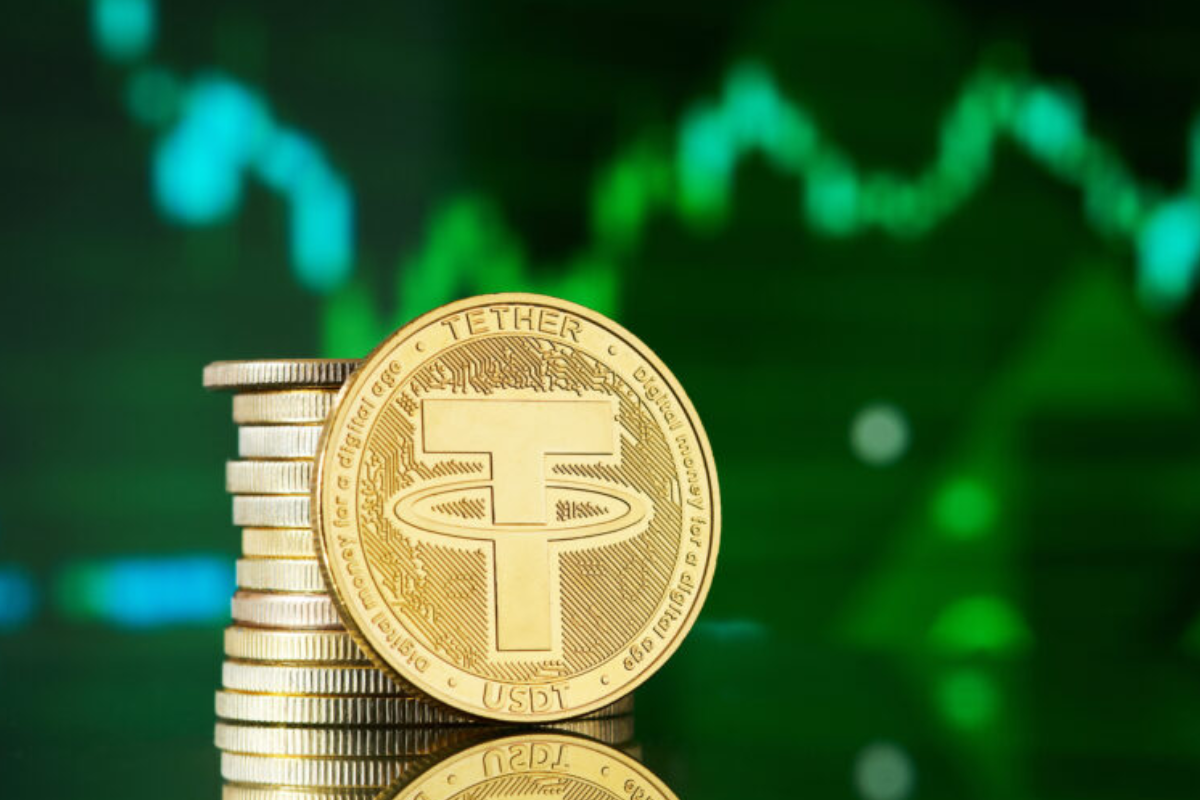Blockchain
TRON and APENFT partner with Decentral Games to take GameFi to the next level

TRON, one of the leading cryptocurrency projects by market cap with a valuation of over $6B, has partnered with Decentral Games to unlock GameFi’s potential to help more ordinary people as it currently has in many regions worldwide.
“I believe that the partnership with Decentral Games will unlock more potential for GameFi,” said TRON CEO and Founder Justin Sun. “It’s fascinating to see how GameFi facilitates a player-owned economy with ownership transfer and additional revenue generation. That has already benefited many ordinary people, especially in South Asia.”
TRON’s investment in $DG represents a strong endorsement of Decentral Games’ cutting-edge play-to-earn innovations. It also follows several high-profile partnerships and collaborations with Binance Smart Chain, Polygon, Theta, Grayscale, Decentraland, and Hashkey, among several others.
TRON launched a $300-million investment pool together with APENFT in August dedicated to advancing GameFi related technology, a space in which Decentral Games has become a prominent player. “GameFi is going to be the next big thing that makes the DeFi, NFT, and larger crypto space easy to understand and be involved in,” Sun said recently.
“The Decentral Games and TRON teams share the belief that play-to-earn will play an outsized role in shaping the broader gaming sector and the future of entertainment and work,” Decentral Games CEO and Founder Miles Anthony said.
“We are excited to work with TRON to accelerate the adoption of NFT and EV-positive gaming technologies for the long-term,” Mr. Anthony added.
GameFi has taken the blockchain game industry by storm as it combines decentralized finance (DeFi), bringing new dimensions to crypto games. For example, players may use and delegate assets to generate yield.
Decentral Games recently launched ICE Poker, an unrivaled play-to-earn (P2E) ecosystem that financially rewards users for their participation. DG’s gameplay mode boosts daily and monthly recurring players on the $DG platform and creates an EV-positive (expected value positive) environment for all players.
As a result of DG’s P2E success, a growing, loyal community of players have collectively provided the project with a formidable moat and dependable cash flows to the platform’s DAO. Year to date, the DG DAO treasury’s total assets have increased exponentially from $500,000 to over $12 million.
Blockchain
Venezuela’s Oil Giant Turns to Crypto as US Sanctions Bite Again

Venezuela’s state-controlled oil company, PDVSA, is ramping up its utilization of digital currencies in response to renewed US oil sanctions. With the Biden administration refusing to renew a license easing restrictions, PDVSA is facing increased pressure to find alternative payment methods for its crude oil and fuel exports. The move to digital currencies, particularly Tether (USDT), aims to circumvent frozen accounts resulting from US sanctions.
This strategic shift underscores Venezuela’s willingness to explore various currencies, including virtual assets, in its oil contracts. Traditionally, the oil market has operated predominantly in US dollars, but Venezuela’s adoption of digital currencies signals a departure from this norm.
Despite past corruption scandals, such as the uncovered $21 billion embezzlement involving oil export receivables, Venezuela’s oil exports have rebounded under the leadership of oil minister Pedro Tellechea. The country has reached a four-year high in oil exports, buoyed by US licenses permitting sales. To mitigate future risks from potential sanctions, PDVSA has implemented a new contract model requiring prepayment in Tether for spot oil deals.
Moreover, Venezuela is now mandating new customers to have digital wallets holding cryptocurrencies for oil transactions. This requirement reflects a broader strategic shift towards embracing digital currencies in the oil trade, indicating a willingness to adapt to evolving global financial landscapes.
However, Venezuela’s foray into digital currencies is not without challenges. The recent arrest of former Vice President Tareck El Aissami, accused of embezzling funds from oil sales using cryptocurrencies, highlights the risks associated with crypto transactions. This high-profile corruption case, dubbed the “PDVSA-crypto incident,” underscores the need for robust regulatory frameworks and measures to prevent misuse of digital assets in the oil industry.
Source: cryptonews.com
The post Venezuela’s Oil Giant Turns to Crypto as US Sanctions Bite Again appeared first on HIPTHER Alerts.
Blockchain
Crypto miners face energy refusal, restriction in Canadian provinces

The decisions made by the Canadian provinces of Manitoba and British Columbia regarding the provision of electricity to cryptocurrency mining operations highlight the growing concerns over energy consumption and its impact on local infrastructure.
In Manitoba, the extension of the moratorium on new power connections for cryptocurrency operations until April 30, 2026, reflects the government’s recognition of the significant strain that these operations place on the province’s electrical grid. The decision aims to buy time for the development of a long-term solution to manage the increasing demand for electricity from cryptocurrency miners. This move aligns with similar actions taken by other provinces, such as New Brunswick and Hydro-Québec, to address the challenges posed by the rapid growth of cryptocurrency mining operations.
Meanwhile, British Columbia has introduced legislation to regulate electricity service to cryptocurrency miners, signaling a more proactive approach to managing energy consumption in the province. By amending the Utilities Commission Act, the BC government aims to have the authority to prohibit, restrict, or regulate the provision of electricity to energy-intensive cryptocurrency mining operations. This move underscores the government’s commitment to ensuring the availability of electricity for essential services while addressing the concerns raised by the proliferation of cryptocurrency mining activities.
Overall, these actions reflect the need for policymakers to strike a balance between supporting innovation and economic development driven by cryptocurrency technologies while ensuring the sustainability of energy resources and the resilience of critical infrastructure. As the cryptocurrency industry continues to evolve, regulatory measures like those implemented in Manitoba and proposed in British Columbia are likely to become more common as governments seek to manage the impacts of cryptocurrency mining on their communities and environments.
Source: cointelegraph.com
The post Crypto miners face energy refusal, restriction in Canadian provinces appeared first on HIPTHER Alerts.
Blockchain
Tether Launches on TON Blockchain with USDT, XAUT

The integration of Tether’s USDT stablecoin and its gold-backed token, XAUT, onto The Open Network (TON) blockchain marks a significant development in the blockchain space. By bringing these stablecoins onto TON, Tether aims to enhance transaction efficiency and liquidity on the platform, particularly for decentralized applications (DApps) operating in sectors such as payments and gaming.
TON, which has gained attention recently due to Telegram’s involvement and revenue-sharing initiatives, stands to benefit from the deployment of Tether’s stablecoins. With its native cryptocurrency, Toncoin, reaching a market capitalization of $21.4 billion, TON has established itself as a prominent player in the cryptocurrency market.
Tether’s USDT stablecoin, boasting a circulating supply of nearly 110 billion, holds the title of the largest stablecoin globally and ranks as the third-largest cryptocurrency overall. This integration not only expands the utility of Tether’s stablecoins but also reinforces TON’s position as a versatile blockchain platform catering to diverse industry needs.
Overall, the integration of Tether’s stablecoins onto TON represents a strategic move to bolster the platform’s functionality and attractiveness to developers and users alike. As blockchain technology continues to evolve, collaborations and integrations like these are poised to drive innovation and growth in the decentralized finance (DeFi) ecosystem.
Source: forkast.news
The post Tether Launches on TON Blockchain with USDT, XAUT appeared first on HIPTHER Alerts.
-

 Blockchain4 days ago
Blockchain4 days agoPhoenix Group Engages BHM Capital as Liquidity Provider to Boost ADX Liquidity and Enhance Market Dynamics
-

 Blockchain5 days ago
Blockchain5 days agoQuantum eMotion Files a Patent for Quantum-based Blockchain Wallet Under the Patent Cooperation Treaty (PCT)
-

 Blockchain Press Releases5 days ago
Blockchain Press Releases5 days agoCanaan Shines at Blockchain Life 2024 in Dubai
-

 Blockchain Press Releases5 days ago
Blockchain Press Releases5 days agoBybit Institutional Report 2024: Institutions Become Bullish and Eye Challenger Chains, while VC Funding Resurges for Infrastructure, Gaming, and AI
-

 Blockchain5 days ago
Blockchain5 days agoElizabeth Warren Urges Treasury Secretary Yellen to Implement Strong AML/CFT Measures for Stablecoins
-

 Blockchain Press Releases6 days ago
Blockchain Press Releases6 days agoBybit and Franck Muller Partner with Sidus Heroes to Launch Cosmic Gears: A Pioneering Web3 Game with a $250,000 Prize Pool and Exclusive Watch Collection
-

 Blockchain4 days ago
Blockchain4 days agoTether USDT stablecoin goes live on TON blockchain
-

 Blockchain4 days ago
Blockchain4 days agoCrypto fans count down to bitcoin’s ‘halving’










































